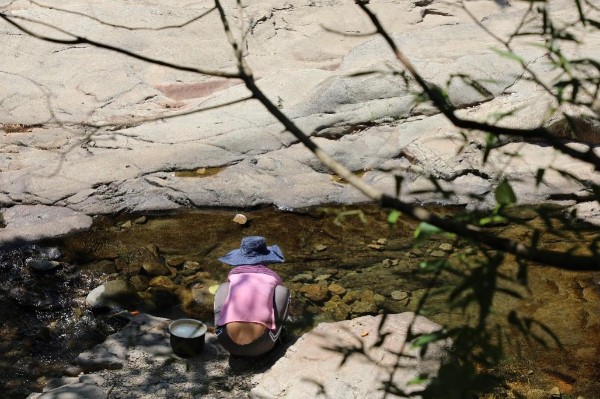A village's green path to common prosperity

A woman cleans rice noodles in the stream. [Photo by Yu Lu for chinadaily.com.cn]
These days, in the heat of summer, when tourists visit Zhilin village in Dayin township of Ningbo, East China's Zhejiang province, they are likely to see local cleaning rice noodles or washing clothes in the stream next to the village.
Sun Youmei, a tourist from the city;s Zhenhai district, recently traveled to Dayin for the second time with her grandson. "I came here to play in the water and escape the summer heat. The environment of the village is always good," she said.
However, 20 years ago, environmental protection was far less important than economic development in the minds of the villagers. More than 30 light-industry enterprises were set up in or around the village at that time, producing hardware, machines, and clothes, as well as serving as a major source of jobs and revenue for locals. However, it also created a significant amount of waste-water.
Things began to change after the government decided to build a reservoir downstream from the village, and the village was place within a first-grade protection zone for drinking water in 2005. No more new factories were allowed to be built in the village, while those already there were forced to move out.
"Also at that time, we found that many people from the cities liked to travel here, even though there was no restaurant to eat at and no shop to buy water," said Huang Qijun, chairman of Dayin township's People's Congress. "We realized that tourism is a much greener way for the village to increase incomes and achieve common prosperity."
The village's development was then given a further boost courtesy of a provincial program that encouraged cooperation between mountainous and coastal areas. The program, which involved having more developed areas or enterprises, most of which are located along the coast, help less developed ones in the mountainous regions, saw the village receive more than 20 million yuan ($2.9 million) in funding from the East China City Group, a well-known private enterprise in Ningbo.
According to the agreement, the East China City Group is responsible for the management and operation of tourist attractions, and 10 percent of the profits from ticket sales will be given to the village every year.
In 2020, the collective income of the village rose to 1.73 million yuan – with more than 900,000 yuan coming from ticket revenues alone.
"Previously, we had only green mountains and clean rivers, but no money or tourism management, which this company can offer. The partnership is a win-win, as we can reap economic benefits and protect the environment at the same time," Huang explained.
By the end of 2019, not a single factory remained in the village. These days, many locals offer agritainment services in their homes, and some have even opened shops in tourist areas.
"Local organic specialties such as dried bamboo shoots, tea, and fruit have been becoming more and more popular in recent years, which increase people's incomes as well," Huang added. "Take organic kiwi as an example - its price has quadrupled from 10 yuan to 40 yuan per kilogram in recent years.”
In 2021, a historical relics exhibition hall was built in the village, which served as the CPC's revolutionary base in eastern Zhejiang during the War of Resistance Against Japanese Aggression. The hall, which is aimed at promoting "red tourism", has also been a revenue generator for the village, welcoming a whopping 80,000 tourists since it opened.
(Written by Liu Ying. Liu is master student majoring in international journalism and communication at Tsinghua University, and is on a field survey tour with her classmates in Zhejiang province from Aug 9-15.)

